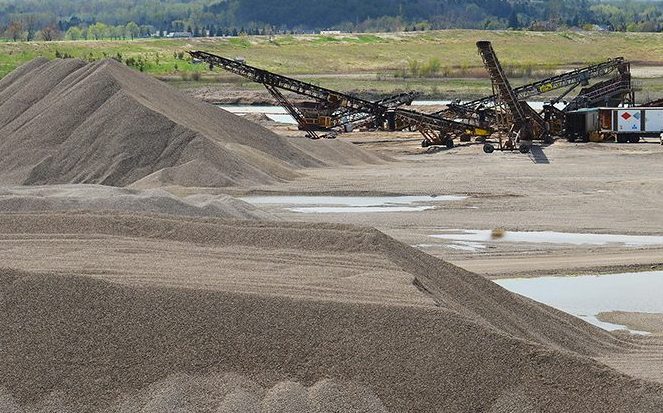GUELPH – An Ontario Divisional Court decision that will see about 50 Wellington County gravel pits pay around $4 million in back taxes is good news for residents of Wellington County and will have implications province-wide, county officials say.
“On February 3, the Ontario Divisional Court released its decision and it’s quite a good read if you’re a municipal property taxpayer, or a resident of Wellington County,” treasurer Ken DeHart told county councillors on Feb. 23.
“It found in our favour in every respect.”
The decision has roots in a series of appeals of the Municipal Property Assessment Corporation’s (MPAC) assessments of aggregate properties which were settled prior to 2016 when MPAC and the Ontario Stone, Sand and Gravel Association (OSSGA) negotiated a new formula for assessment of gravel pits and quarries.
The land value for the purpose of current value assessment became approximately $9,200 per acre in Wellington County’s three southeastern municipalities: Puslinch, Erin and Guelph/Eramosa.
“This value compared to an industrial land rate of up to $137,000/acre in some other areas,” the court decision notes.
County officials commenced approximately 50 appeals of the land use classification of portions of aggregate properties on behalf of the three member municipalities for the 2016 assessment cycle.
They asserted that, contrary to the legislation, MPAC’s formula did not accurately determine the current value of the land because the lands were not classified properly.
The county, MPAC, and the owners agreed that six of the appeals would be heard as “representative appeals with the intention those appeals would result in valuation and classification principles which could be applied to the assessment of the other aggregate properties subject to appeal.”
The sites in question were owned by Capital Paving Inc., CRH Canada Inc., Preston Sand and Gravel Company, 2416854 Ontario Inc. and St. Marys Cement Inc.
A provincial Assessment Review Board decision in 2021 directed that more of the land used for gravel pit operations was to be classified as industrial, rather than residential, meaning it would be taxed at a higher rate.
The appeal board found that having gravel pit land zoned as residential “is to the benefit of the owners and to the detriment of all other taxpayers of the County of Wellington.”
This led to an appeal by the landowners, which was rejected by the Divisional Court in the Feb. 3 decision.
The court also awarded the county $15,000 in court costs.
Both MPAC and the property owners had 15 days to appeal the Divisional Court decision to the Ontario Court of Appeals.
DeHart said MPAC notified the county directly it would not appeal, and the deadline has now passed for the owners to appeal.
“So we think that this process is done,” DeHart stated.
He told council the decision relates to assessment values in 2016, which were implemented in 2017 and “have been with us going forward.
“The bottom line is the property assessment values severely undervalued these properties and interpreted a narrow interpretation as to what portions of the business were considered industrial, which is subject to a higher tax rate,” DeHart explained.
“We believe we’ve made progress on both of those ends. For example, gravel pits in Wellington County were valued at $9,000 an acre, and now we’re over $15,000 an acre.
“And we have also included more portions of the property in the industrial class.”
In its appeal that led to the 2021 decision, the county argued assessment of up to $137,000 per acre would be more realistic for some of the properties, based on sale values of vacant land available for development as gravel pits.
However, the review board ruled gravel pits are unique in Ontario due to legislation that sets them apart by distinguishing the value of the aggregate itself from the cost of the land, meaning they can only reasonably be compared to other gravel pits.
Since the original decision was released in 2021 by the assessment review board, there have been hundreds of appeals by municipalities across the province.
“So Wellington County has a bit of a feather in our cap in that we led this charge and it will have a positive impact on municipal property taxpayers across Ontario,”DeHart stated.
Councillor Chris White said, “So at the end of the day, it makes the tax system a little fairer.
“Once again, the County of Wellington is leading edge. This will be taken across the province and … the rest of the province should thank you and your staff for the great work on this.”
Councillor James Seeley asked DeHart to provide some information on the financial impact of the decision.
“We appealed every gravel pit … in Puslinch, Erin and Guelph/Eramosa in 2017. So that amounts to approximately 50 pits,” DeHart explained.
“We have a very brief analysis that estimates it will be about $4 million worth of back taxes owing by gravel pit owners.
“And of course that is to be split between the county, our member municipalities and the province for the education portion of the tax.”
DeHart noted there are about 40 further appeals outstanding in the remaining municipalities in the county.
“At at this point, I don’t have a financial analysis of what that might be,” he stated.




